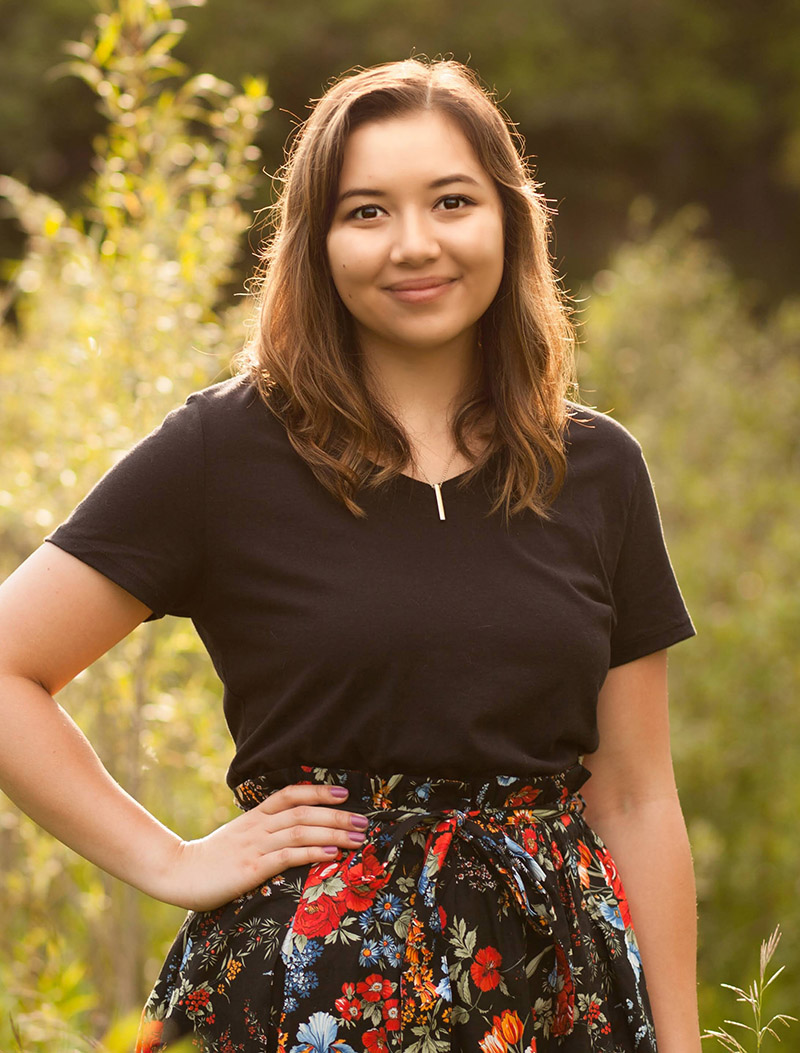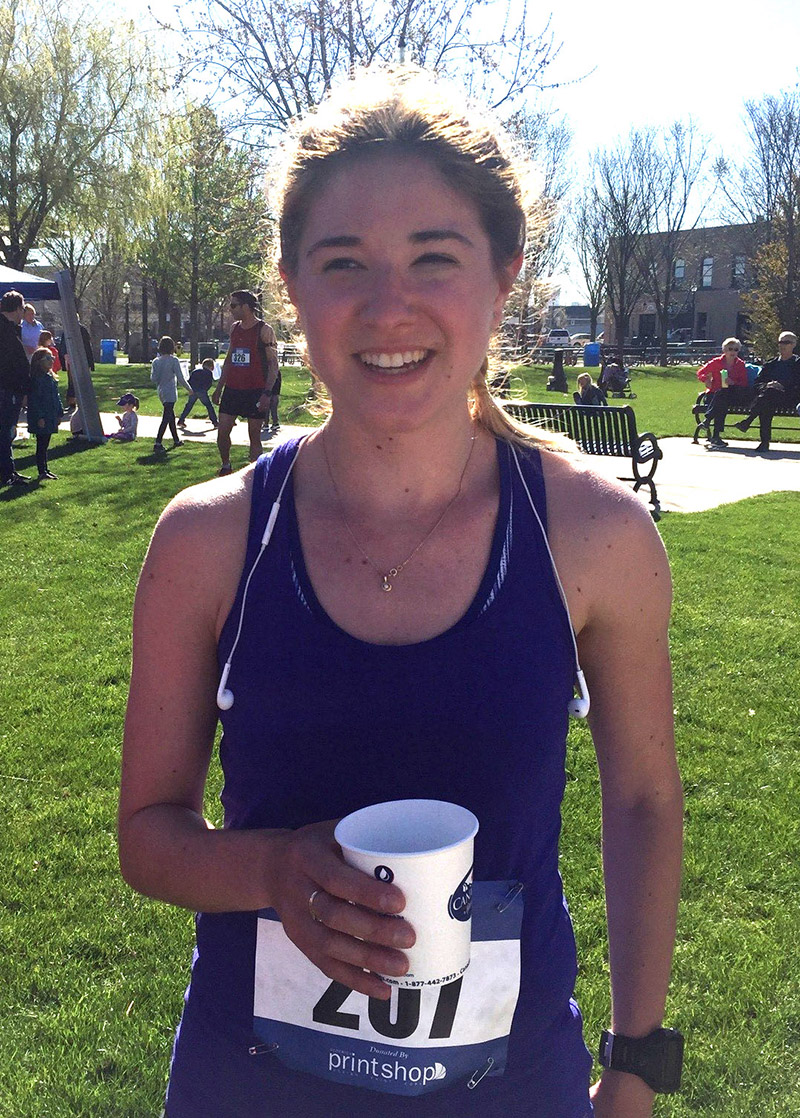
Emily and Lucy
In 1958 a woman named Sue immigrated to Canada from Hong Kong. She faced a language barrier, culture shock, and a brand-new community into which she was entering. It must have been quite difficult, but also quite fascinating, to experience everything that was new and different about our country. Emily Cruikshank thinks about Sue, her grandmother, a lot. What frightened her? What amused her? What did she find overwhelming, and what did she take to right away? And how did she manage to make connections with other people despite all the obstacles?
Emily thinks about Sue because her experience has been very different. Emily makes connections quite easily, sometimes in ways that come as a surprise.

When students sign up for the CPA’s Student Mentorship program, they fill out a questionnaire that, much like a dating site, pairs them with a mentor or mentee that shares common traits. Are they looking to follow a similar career path? Is their reason for choosing psychology aligned with that of the other person? What are they looking to get out of their school, their courses, and their affiliation with the CPA?
Every now and then, the partnership that is formed goes well beyond the commonalities identified by that questionnaire. Such is the case with Lucy Muir, an undergrad psychology student at Ryerson, and her mentor Emily Cruikshank, a PhD student at the University of Alberta.
Emily is really into popular music – the way pop songs affect people, the way they influence culture, and the music of history that shapes the music of today. Before going to Ryerson for psychology, Lucy spent six years working across Canada in the radio industry.
TAKE FIVE WITH EMILY CRUIKSHANK AND LUCY MUIR
What is the psychological concept (bystander apathy, confirmation bias, that sort of thing) that blew you away when you first heard it?
Emily: So many! Psychology is such a rich and interesting field. But one that really shook me has to do with situational attribution or the idea that the role you are given can impact your behaviour so much. When I first learned about the Stanford Prison Experiment and the Milgram Shock Experiment I could not believe that people could do such awful things based on suggestions. But once I understood the motivation behind these actions I realized that none of us are that far off from “shocking” an innocent person!
Lucy: The rubber hand illusion! That’s and experiment where the participant has one hand out on the table, and their other hand is hidden behind an object. Then the researcher puts a rubber hand where that hidden hand would ordinarily be, beside the real hand. Then the researcher strokes your hidden hand and the rubber hand at the same time. Eventually, the participant feels the sensation IN the rubber hand. They feel as if that rubber hand is part of their body!
Do you have a sport? What is it and do you watch, play, follow it?
Emily: I am slowly getting better at long-distance running, and I love following some of the big long-distance runners in Canada and all over the world. But my all-time favourite sport is Rhythmic Gymnastics. I was on a provincial-level team when I was a young girl and I fell in love with the strength and beauty of the sport. I think it is such an amazing combination of athleticism, dance and art. My mom and I always watch the world championships and the Olympics together.
Lucy: Both of us are long distance runners. When I’d go for a long run, weird stuff was happening in my brain, and that’s one of the things that got me into psychology – I thought, ‘I want to know more about what is going on!’
If you could spend a day in someone else’s shoes who would it be and why
Lucy: As I’m answering all these questions, I’m thinking maybe I want to be a Broadway star! I’m always thinking about Broadway. So I’d love to spend a day in the mind and shoes of any of the cast members of Hamilton!
Emily: Oh my gosh, right!? I totally agree. Anyone from Hamilton. But I still think I would choose my grandma when she first came to Canada. I have always been so amazed at her strength in coming to Canada from Hong Kong and wondered what it must have been like for her.
If you could become an expert at something outside psychology, what would it be?
Emily: I would love to be an expert in popular music. It’s an area I love, I took one class in my undergraduate degree on the topic, and I think it is so cool that you could become an academic on something that impacts and changes our culture so heavily and at such a quick pace!
Lucy: There’s so much! But I would probably say physics, like quantum physics or something. I was really into math in high school and I didn’t go anywhere with it, but I’ve always found it fascinating.
Favourite word
Emily: Empower
Lucy: Burrito
Lucy is a passionate long-distance runner, and gets out to run every day as she finds it helps her mental health, especially during this pandemic where she is stuck inside so much of the time. Emily is also a distance runner, and has done 10k races and half marathons.
And, of course, they share a passion for psychology. When Lucy describes being blown away by the rubber hand illusion, Emily chimes in right away – that WAS amazing, wasn’t it? She expands on the concept, describing how that particular phenomenon has led to some interesting therapies for people with amputated limbs.
Theirs is a symbiotic mentor-mentee relationship. They meet about once a month, and Lucy tells Emily all about what she’s doing, and where she might need help. Recently, she needed some clarification on the very broad concept of ‘consciousness’.
“I just talked to Emily about it. I wasn’t quite getting what consciousness actually was, and we basically talked it out. Emily wasn’t giving me a quick nice definition for what it is – because that might not even exist – but we just talked it out. And now I get it a lot better. We also talk about just general school things, like doing classes over Zoom, and that’s pretty great.”
It’s pretty great for Emily as well. When the opportunity came up to become a mentor, she realized she wished she had had one herself as a young undergrad. So she signed up, was paired with Lucy, and they entered the program together. But that was only the beginning for Emily, who became quite inspired with the process – enough to extend her mentorship far beyond just the CPA program.
“I got really excited about [being a mentor] because I’m a big advocate of mentoring, especially for people who are looking to move forward in their studies in psychology. When I got into grad school, I wanted to participate in bridging the gap between people in undergraduate work who were interested but maybe didn’t know what options were out there. I’m really happy that the CPA is doing this kind of program because I think it’s so helpful. My program at the University of Alberta has their own internal mentoring program, so I’m also mentoring a student in the first year of their Masters program. I even do some work at my undergrad alma mater [MacEwan University] where I go into one of the 400-level classes each semester and do a Q&A about graduate school with them.”
Imagine how Sue’s life would have been different had she had a mentor when she arrived in Canada. Someone to show her who the Chinese-speaking community was, where to find the groceries she wanted, how to navigate finding employment, housing, and education for her family. Even without a mentor Sue managed to overcome all the hurdles she faced, with a strength that impresses Emily to this day.
Sue passed down some of that strength to Emily, who now shares some of it with Lucy. Lucy brings a strength of her own to Ryerson, to her studies, and to this partnership with Emily. Together, they are better off than they would be alone – and the fact that they enjoy speaking with one another is a nice bonus.
Perhaps one day they can meet in person, maybe at a race weekend half-marathon event somewhere in Canada. In the meantime, Emily will complete her PhD and go into the clinical work toward which she’s been working. Lucy will make her way through psychology studies, her future and a variety of career paths wide open to her. She says her initial attraction to the discipline came from sport psychology. Emily jumps in.
“My husband was telling me how these e-sport teams even have their own sport psychologists now, who work with them on their training for video game competitions. They do it in Korea and China, and I just thought wow – that’s a whole other level of sports psychology!”
So how about that for a career path, Lucy? Sports psychologist for a Korean team of Super Smash Brothers experts?
“Yep, done. Decision made. This is now what I’m working toward, officially.”
